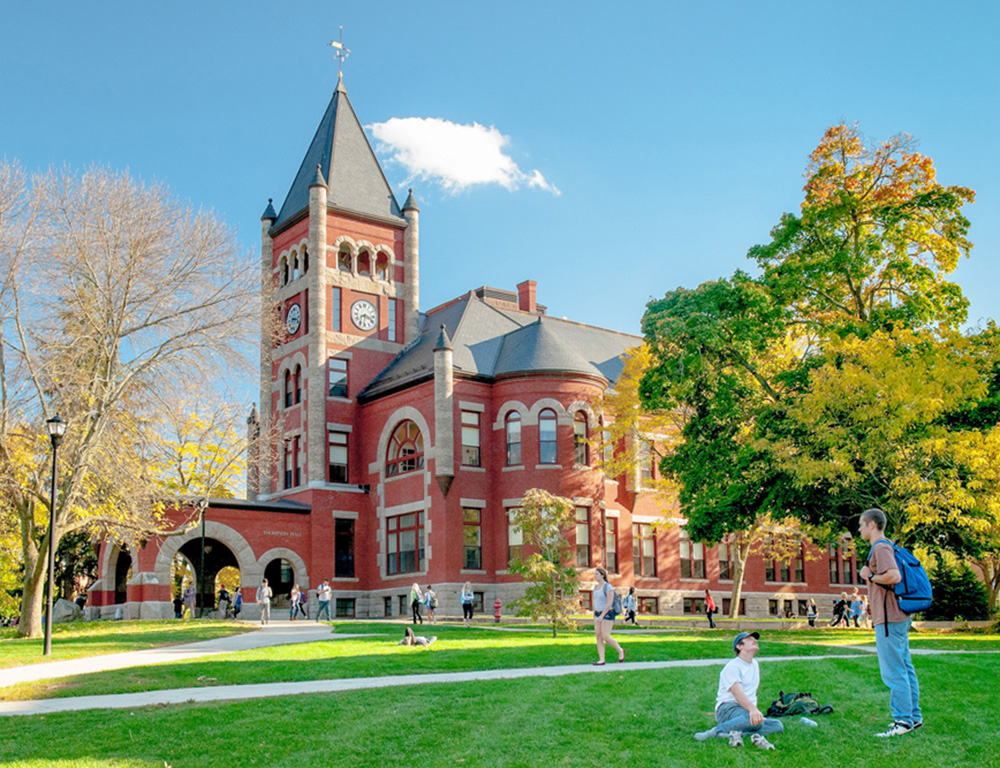The School of Marine Science and Ocean Engineering serves as an interdisciplinary nexus for marine science and ocean engineering teaching and research across the University.
Ocean Mapping (Graduate Certificate)
Ocean Mapping (Graduate Certificate)

The Center for Coastal and Ocean Mapping helps students develop tools to advance ocean mapping and hydrography and trains the next generation of hydrographers and ocean mappers.
Why get a graduate certificate in ocean mapping?
More than 85% of the ocean floor is still unexplored. Ocean mappers are modern-day explorers, mastering not only the elements of mapping the seabed, but also becoming adept at such topics as the geologic characterization of the seabed and the mapping of living ocean resources and habitats. The ocean mapping graduate certificate is designed to provide advanced graduate training to working professionals who come from backgrounds ranging from earth science, geology and biology to engineering. You’ll complete core courses and an associated practicum for this certificate, which also fulfills the Category A International Federation of Surveyors/International Hydrographic Organization/International Cartographic Association (FIG/IHO/ICA) Standards of Competence for Hydrographic Surveyors.
Why get your graduate certificate in ocean mapping at UNH?
At UNH, you’ll gain critical skills through rigorous classes and research projects. You’ll have access to exceptional equipment and facilities, including the Center for Coastal and Ocean Mapping/Joint Hydrographic Center, one of four data centers for the Seabed 2030 project, which aims to create the definitive map of the world ocean floor by 2030; the Jere A. Chase Ocean Engineering Laboratory; and the R/V Gulf Surveyor, a 48-foot ship purpose-designed for ocean mapping activities. Our extensive experimental and computational facilities include a variety of test tanks, autonomous and robotic vehicle development programs, high-performance computing clusters and data stores, and a data visualization laboratory.
Potential career areas
- Academic research
- Data analysis
- Environmental/hydrographic consulting
- Governmental agencies (NOAA, NAVO, USACE, NGA)
- Hydrographic surveying
- K-12 and university education
- Marine hardware and software development
- Marine research
- Marine resource management
- Mineral resources exploration
- Ocean technology
- Remote sensing
- State regulatory agencies
Contact
24 Colovos Road
Durham, NH 03824
P: 603.862.0672
E: marine.information@unh.edu
Curriculum & Requirements
The program goal is to provide advanced graduate training to working professionals in the area of ocean mapping. These professionals will come from a variety of backgrounds ranging from earth science, geology, and biology to engineering. The graduate certificate in ocean mapping is awarded for completion of the core courses and associated practicum. The graduate certificate program fulfills the Category A International Federation of Surveyors/International Hydrographic Organization/International Cartographic Association (FIG/IHO/ICA) Standards of Competence for Hydrographic Surveyors.
For more information, please visit the ocean mapping website or contact the Center for Coastal and Ocean Mapping/Joint Hydrographic Center at info@ccom.unh.edu.
Applying
Please visit the Graduate School website for instructions about applying to the certificate program.
Certificate Requirements
| Code | Title | Credits |
|---|---|---|
| ESCI/OE 871 | Geodesy and Positioning for Ocean Mapping | 4 |
| ESCI 872 | Applied Tools for Ocean Mapping | 2 |
| ESCI/OE 874 | Integrated Seabed Mapping Systems | 4 |
| ESCI/OE 875 | Advanced Topics in Ocean Mapping | 4 |
| ESCI 896 | Topics (for the optional Remote Sensing specialty) | 3 |
| ESCI 972 | Hydrographic Field Course | 4 |
| MATH 896 | Topics in Mathematics and Statistics | 3 |
OE 677 | Seamanship and Marine Weather for Ocean Engineers and Scientists | |
| Total Credits | 24 | |
Deadline
Applications must be completed by the following deadlines in order to be reviewed for admission:
- Fall: July 1
- Spring: N/A
- Summer: N/A
- Special: N/A
Application fee: $25
Campus: Durham
New England Regional: No
Accelerated Masters Eligible: No
New Hampshire Residents
Students claiming in-state residency must also submit a Proof of Residence Form. This form is not required to complete your application, but you will need to submit it after you are offered admission or you will not be able to register for classes.
Transcripts
If you attended UNH or Granite State College (GSC) after September 1, 1991, and have indicated so on your online application, we will retrieve your transcript internally; this includes UNH-Durham, UNH-Manchester, UNH Non-Degree work and GSC.
If you did not attend UNH, or attended prior to September 1, 1991, then you must upload a copy (PDF) of your transcript in the application form. International transcripts must be translated into English.
If admitted, you must then request an official transcript be sent directly to our office from the Registrar's Office of each college/university attended. We accept transcripts both electronically and in hard copy:
- Electronic Transcripts: Please have your institution send the transcript directly to grad.school@unh.edu. Please note that we can only accept copies sent directly from the institution.
- Paper Transcripts: Please send hard copies of transcripts to: UNH Graduate School, Thompson Hall- 105 Main Street, Durham, NH 03824. You may request transcripts be sent to us directly from the institution or you may send them yourself as long as they remain sealed in the original university envelope.
Transcripts from all previous post-secondary institutions must be submitted and applicants must disclose any previous academic or disciplinary sanctions that resulted in their temporary or permanent separation from a previous post-secondary institution. If it is found that previous academic or disciplinary separations were not disclosed, applicants may face denial and admitted students may face dismissal from their academic program.
Letters of Recommendation: 2 Required
Recommendation letters submitted by relatives or friends, as well as letters older than one year, will not be accepted.
Personal Statement/Essay Questions
Prepare a brief but careful statement regarding:
- Reasons you wish to do graduate work in this field, including your immediate and long-range objectives.
- Your specific research or professional interest and experiences in this field.
Important Notes
All applicants are encouraged to contact programs directly to discuss program-specific application questions.
International Applicants
Prospective international students are required to submit TOEFL, IELTS, or equivalent examination scores. English Language Exams may be waived if English is your first language. If you wish to request a waiver, then please visit our Test Scores webpage for more information.
Explore Program Details
The Center for Coastal and Ocean Mapping promotes and fosters the education of a new generation of hydrographers and ocean-mapping scientists to meet the growing needs of both government agencies and the private sector.



